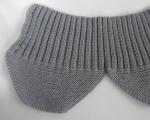Mitrofan's relationship with his mother. A son worthy of his mother (Based on the comedy D
Mitrofan.
Literally translated from Greek, the name Mitrofan means “showing his mother,” that is, resembling his mother. This is a striking type of spoiled “mama’s boy”, who grew up and developed in the ignorant environment of the feudal landed nobility. Serfdom, the home environment and the absurd, ugly upbringing spiritually ruined and corrupted him. By nature, he is not devoid of cunning and intelligence.
He sees perfectly well that the mother is the sovereign mistress of the house, and he plays nice with her, pretends to be a son who loves her tenderly (story about the dream) or scares her with the threat of drowning if he is not saved from his uncle’s fists and tortured by reading the book of hours.
Mitrofan's mental development is extremely low, since he has an insurmountable aversion to work and learning. The scenes of his classes with the teacher and the exam clearly and fully show his mental squalor, ignorance of the sciences and reluctance to understand anything, to learn new things. The dovecote, hearth pies, sweet sleep and the idle life of the barchuk are much dearer to him than mental pursuits. Mitrofan does not know love for anyone, even for those closest to him - his father, mother and nanny.
He doesn’t talk to teachers, but “barks,” as Tsyfirkin puts it; He calls Eremeevna, who is devoted to him, “an old bastard,” and threatens her with fierce reprisals: “I’ll get you off!” When Sophia’s kidnapping failed, he angrily shouts: “Take care of people! He rudely pushes his mother, who has lost both power and property, and rushed to him in despair: “Let go, mother, just like you imposed yourself. Mitrofan's speech fully reflects his character and his distinctive qualities. Mitrofan's mental poverty and underdevelopment are reflected in the fact that he does not know how to use words and speak coherently. He expresses himself in one word: Probably, brother. “Which door is which? To hell with everything!” His language contains a lot of colloquialisms, words and phrases borrowed from servants: For me, wherever they tell you to go. And look at that, it’s a task from Uncle”, “Remember Nyrnu as his name was!
The main tone of his speech is the capricious, dismissive, rude rush of a spoiled “mama’s son,” a barchuki, a future despot and tyrant. Even with his mother, he speaks more than cheekily, and sometimes he is insolent to her.
The image of Mitrofan is revealed widely and diversified: his attitude towards his parents, towards his uncle, towards teachers, towards Eremeevna, his activities, pastime, the conditions that shaped his character, the reasons for his attitude towards his mother at the beginning and end of the comedy are shown. The author’s attitude towards him is sharply negative
The image of Mitrofan is an image of enormous generalizing power. The name Mitrofanushka became a household name. The very word “minor,” which before Fonvizin meant a noble teenager under 16 years of age, became synonymous with a complete ignoramus who knew nothing and did not want to know anything.
One of the main characters in the comedy D.I. Fonvizin “Undergrown” appears Prostakov Mitrofan, a young nobleman, an undergrowth. Translated, the name Mitrofan means “revealing his mother.” And the young man successfully confirms his name.
From a young age, Mitrofan learned to be rude and disrespectful towards people. Like Prostakov, he perceives serfs as objects without feelings and emotions. The same way his mother treats his father - she scolds him, sometimes raises her hand at him, so Mitrofan treats his parents - even in a simple conversation he calls them both rubbish. And in a difficult moment for the mother (at the end of the play) he completely abandons her.
Prostakova’s influence on the development of a teenager’s personality
The mother showed concern for her son's education, but she did this only as a diversion - guided by the state decree on the need for science to enter the service.
Mitrofan's teachers cannot be called specialists, but even the little that they try to convey to him, he is not able to perceive. Perhaps the mother’s influence is also evident here - she convinces her son to study only for the eyes, asks him not to listen too closely to the words of the teachers, and to focus more on her advice. Of all the teachers, only Vralman praises the undergrowth, wanting to win Prostakova’s favor. But the name of Adam Adamych speaks for itself.
Listening to his mother’s advice, Mitrofan did not know the basic rules of grammar and arithmetic, and had no idea about the history of the country and the geographical location of the states.
Attitude towards relatives
Despite his mother’s care, Mitrofan has no respect for either her or his father. Here, too, the example of the mother is significant - she does not respect anyone around her, and her son behaves the same way. He doesn’t feel sorry for Prostakova at all, he neglects her, doesn’t respect her, plays with her feelings for his own whim.
His father matters even less to him. Most likely because Prostakov, fearing his wife’s anger, constantly praises his son, for no reason at all. Mitrofan was always rude to Uncle and was afraid of his anger. In other words, no one from the undergrowth’s family received his love. I think he simply didn’t know how to love and didn’t know that such a feeling even existed.
Conclusion
In the finale of the comedy, everyone gets what they deserve: Prostakova renounces his own son, Mitrofan goes to serve. One can only hope that the service will have a beneficial effect on him, and he will at least understand something in this life, realize his mistakes and correct them.
Modern young people should also think about Mitrofan’s problem. It is no coincidence that the work has not lost its relevance in our time - today’s young people sometimes commit the same offenses as Mitrofanushka almost three centuries ago.
The comedy by D. I. Fonvizin “Nedorosl” was written at the end of the 18th century. Today is the 21st century, and many of its problems are relevant, the images are still alive. One of the main problems raised by the play is the writer’s thoughts about the legacy that the Prostakovs and Skotinins are preparing for Russia Before Fonvizin, the word “minor” had a condemnatory meaning. Minors were the children of the nobility who had not reached 15 years of age, i.e., the age appointed by Peter I for entering the service. In Fonvizin it received a mocking, ironic meaning.
Raising children is a state problem. But it is solved not only by the education system, but also by each family individually.
Until the age of sixteen or seventeen, noble children are only “underage.” They eat pies in abundance, chase pigeons, and are frequent visitors to "girls' rooms." They don’t bother themselves with anything, they don’t care about anything.
But childhood passes quickly, children must grow up, go into public service or continue the work of their parents. This means that they need to be prepared for adult life, and parents prepare their children for life in accordance with their ideals (if they have them), each in their own way. Mitrofan is the only son of provincial parents.
Nobleman, future serf owner or civil servant. “Resembling his mother”... This already says a lot.
Mrs. Prostakova is a cruel and domineering woman, insidious, cunning and greedy. An ignorant mother teaches her son science, but she hired teachers “at a cheaper price”, and even then gets in the way. What is her advice to her son worth: “...
my friend, at least for the sake of appearance, learn, so that it reaches his ears how you work! stupid, greedy, lazy.
In a fit of rage, she screams at the yard girl Palashka, who is seriously ill. She does not take into account the dignity of those who live next to her: she has long crushed her husband, depriving him of his will and his opinion, and humiliates Sophia, considering her a parasite. In Prostakova we see only a landowner, illiterate, cruel and unbridled.
We don’t see a woman in her, she has no intelligence, no mercy. In some respects, Mitrofan went further than his mother.
Let us remember how he feels sorry for his mother, who was tired of beating her father. He understands very well who is the real boss in the house, and clumsily flatters his mother. Blindly and recklessly loving her son, Prostakova sees his happiness in wealth and idleness.
Having learned that Sophia is a rich bride, the mother curries favor with the girl and wants to marry her son by any means. Prostakova thinks that with his intelligence Mitrofan will “fly far”, forgetting the folk wisdom: “What goes around comes around.” Apparently, she did not know folk wisdom, because for her people are worse than cattle. Eremeevna, who devoted her entire life to serving in the Prostakov family, deserved nothing except punches. Teachers came to Mitrofan, and he grumbled: “Get them shot!”
Mitrofan calls Tsyfirkin, who wants to teach him something, a “garrison rat,” and after failing to kidnap Sophia, he and his mother intend to “take on people,” that is, flog the servants. So, Prostakova raised her son the way she knew how and the way she wanted. What happened? At the most critical moment of her life, when she found herself “at a broken trough,” Prostakova rushes to her son with an exclamation: “You’re the only one left for me, my dear friend, Mitrofanushka!” and comes across her son’s callous, rude answer: “Go away, mother , how imposed!
“My son’s evil spirit is a direct consequence of the bad qualities of his parents. Mitrofan is a ignoramus, first of all, because he is a complete ignorant, knowing neither arithmetic nor geography, unable to distinguish an adjective from a noun. But he is also a ignoramus in moral terms, since he does not know how to respect dignity other people.
He is also immature in the civic sense, since he has not matured enough to understand his responsibilities to the state. It is quite natural that civic feeling is alien to the Skotinin-Prostakovs, the thought “of being useful to their fellow citizens cannot come to these heads. Mitrofan is not eager for either teaching or service and prefers the position of a “minor.” Mitrofan’s sentiments are completely shared by his mother. “Until Mitrofanushka “He’s still a little undergrowth,” she reasons, “for now we can pamper him, and then in a dozen years he’ll be released, God forbid, into the service, he’ll suffer everything.”
Are there many such Mitrofans? Vralman said about this: “Don’t worry, my mother, don’t worry: what a terrible son you are - there are millions of them in the world.” “We see,” says Starodum, “all the unfortunate consequences of bad upbringing.” Now is a different time, different people.
But he tells us: family educates first of all. Children inherit from their parents not only genes, but also ideals, habits, ways of thinking and living. As a rule, the apple doesn’t fall far from the tree.
The comedy by D. I. Fonvizin “The Minor” was written at the end of the 18th century. Today is the 21st century, and many of its problems are relevant, the images are still alive. One of the main problems raised by the play is the writer’s thoughts about the legacy that the Prostakovs and Skotinins are preparing for Russia. Before Fonvizin, the word “minor” did not have a condemnatory meaning. Minors were the children of the nobility who had not reached 15 years of age, i.e., the age appointed by Peter I for entering the service. In Fonvizin it received a mocking, ironic meaning.
Raising children is a state problem. But it is solved not only by the education system, but also by each family individually.
Until the age of sixteen or seventeen, noble children are only “undergrown.” They eat pies in abundance, chase pigeons, and are frequent visitors to "girls' rooms." They don’t bother themselves with anything, they don’t care about anything. But childhood passes quickly, children must grow up, go into public service or continue the work of their parents. This means that they need to be prepared for adult life, and parents prepare their children for life in accordance with their ideals (if they have them), each in their own way.
Mitrofan is the only son of provincial parents. Nobleman, future serf owner or civil servant. “Resembling his mother”... This already says a lot. The mother, Mrs. Prostakova, is a cruel and domineering woman, insidious, cunning and greedy. An ignorant mother teaches her son science, but she hired teachers “at a cheaper price”, and even then gets in the way. What is her advice to her son worth: “...my friend, at least for the sake of appearance, learn, so that it reaches his ears how hard you work!” “If you find the money, don’t share it with anyone. Take it all for yourself, Mitrofanushka. Don’t learn this stupid science!”
Mitrofan's mother raises him in her own image and likeness: he is stupid, greedy, lazy. In a fit of rage, she screams at the yard girl Palashka, who is seriously ill. She does not take into account the dignity of those who live next to her: she has long crushed her husband, depriving him of his will and his opinion, and humiliates Sophia, considering her a parasite. In Prostakova we see only a landowner, illiterate, cruel and unbridled. We don’t see a woman in her, she has no intelligence, no mercy.
Blindly and recklessly loving her son, Prostakova sees his happiness in wealth and idleness. Having learned that Sophia is a rich bride, the mother curries favor with the girl and wants to marry her son by any means.
Prostakova thinks that with his intelligence Mitrofan will “fly far”, forgetting the folk wisdom: “What goes around comes around.” Apparently, she did not know folk wisdom, because for her people are worse than cattle. Eremeevna, who devoted her entire life to serving in the Prostakov family, deserved nothing except punches.
Teachers came to Mitrofan, and he grumbled: “Get them shot!” Mitrofan calls Tsyfirkin, who wants to teach him something, a “garrison rat,” and after failing to kidnap Sophia, he and his mother intend to “take on people,” that is, flog the servants.
So, Prostakova raised her son the way she knew how and the way she wanted. What happened? At the most critical moment of her life, when she found herself “at breaking point,” Prostakova rushes to her son with the exclamation: “You are the only one left for me, my dear friend, Mitrofanushka!” - and comes across the callous, rude answer of his son: “Let go, mother, how you imposed yourself!” The son's "evil character" is a direct consequence of the bad qualities of his parents.
Mitrofan is an undergrowth, first of all, because he is a complete ignorant, knowing neither arithmetic nor geography, unable to distinguish an adjective from a noun. But he is also immature morally, since he does not know how to respect the dignity of other people. He is also immature in the civic sense, since he has not matured enough to understand his responsibilities to the state. It is quite natural that the Skotinin-Prostakovs have no sense of citizenship; the idea of “being useful to their fellow citizens” cannot enter their heads.
Mitrofan is not eager to study or serve and prefers the position of a “minor.” Mitrofan's sentiments are completely shared by his mother. “While Mitrofanushka is still in his infancy,” she argues, “it’s time to pamper him, and then in a dozen years he’ll be released, God forbid, into the service, he’ll suffer everything.”
Are there many such Mitrofans? Vralman said about this: “Don’t worry, my mother, don’t worry: what a terrible son you are - there are millions of them in the world.” “We see,” says Starodum, “all the unfortunate consequences of bad upbringing.”
Now is a different time, different people. But Fonvizin tells us: family brings up first of all. Children inherit from their parents not only genes, but also ideals, habits, ways of thinking and living. As a rule, the apple doesn’t fall far from the tree.
To the question Minor, the relationship between mother and son? given by the author Neuropathologist the best answer is A son worthy of his mother (Based on the comedy by D. I. Fonvizin “The Minor”)
Raising children is a state problem. But it is solved not only by the education system, but also by each family individually.
Until the age of sixteen or seventeen, noble children are only “underage.” They eat pies in abundance, chase pigeons, and are frequent visitors to "girls' rooms." They don’t bother themselves with anything, they don’t care about anything. But childhood passes quickly, children must grow up, go into public service or continue the work of their parents. This means that they need to be prepared for adult life, and parents prepare their children for life in accordance with their ideals (if they have them), each in their own way.
Mitrofan is the only son of provincial parents. Nobleman, future serf owner or civil servant. “Resembling his mother”... This already says a lot. The mother, Mrs. Prostakova, is a cruel and domineering woman, insidious, cunning and greedy. An ignorant mother teaches her son science, but she hired teachers “at a cheaper price”, and even then gets in the way. What is her advice to her son worth: “...my friend, at least for the sake of appearance, learn, so that his ears can reach how hard you work!” “When you find the money, don’t share it with anyone. Take it all for yourself, Mitrofanushka. Don’t learn this stupid science!
Mitrofan's mother raises him in her own image and likeness: he is stupid, greedy, lazy. In a fit of rage, she screams at the yard girl Palashka, who is seriously ill. She does not take into account the dignity of those who live next to her: she has long crushed her husband, depriving him of his will and his opinion, and humiliates Sophia, considering her a parasite. In Prostakova we see only a landowner, illiterate, cruel and unbridled. We don’t see a woman in her, she has no intelligence, no mercy.
In some respects, Mitrofan went further than his mother. Let us remember how he feels sorry for his mother, who was tired of beating her father. He understands very well who is the real boss in the house, and clumsily flatters his mother.
Blindly and recklessly loving her son, Prostakova sees his happiness in wealth and idleness. Having learned that Sophia is a rich bride, the mother curries favor with the girl and wants to marry her son by any means.
Prostakova thinks that with his intelligence Mitrofan will “fly far”, forgetting the folk wisdom: “What goes around comes around.” Apparently, she did not know folk wisdom, because for her people are worse than cattle. Eremeevna, who devoted her entire life to serving in the Prostakov family, deserved nothing except punches.
Teachers came to Mitrofan, and he grumbled: “They're shot!” Mitrofan calls Tsyfirkin, who wants to teach him at least something, a “garrison rat,” and after failing to kidnap Sophia, he and his mother intend to “take up for the people,” that is, to flog the servants.
So, Prostakova raised her son the way she knew how and the way she wanted. What happened? At the most critical moment of her life, when she found herself “at a broken trough,” Prostakova rushes to her son with an exclamation: “You are the only one left for me, my dear friend, Mitrofanushka!” - and comes across her son’s callous, rude answer: “Yes, get rid of it, mother, how intrusive! “The son’s “evil character” is a direct consequence of the bad qualities of his parents.



